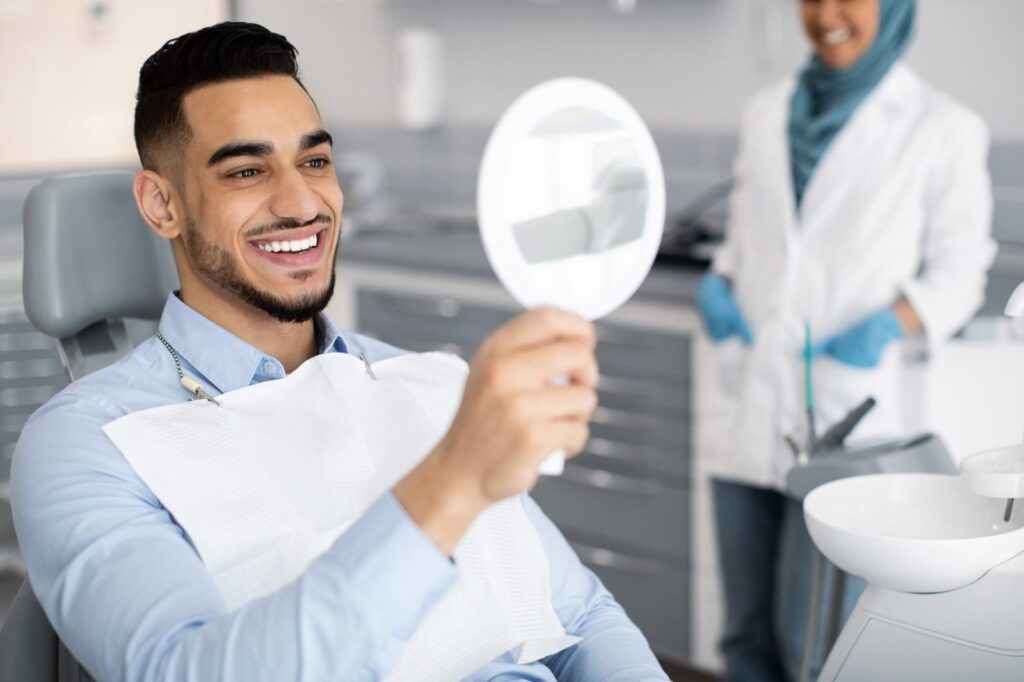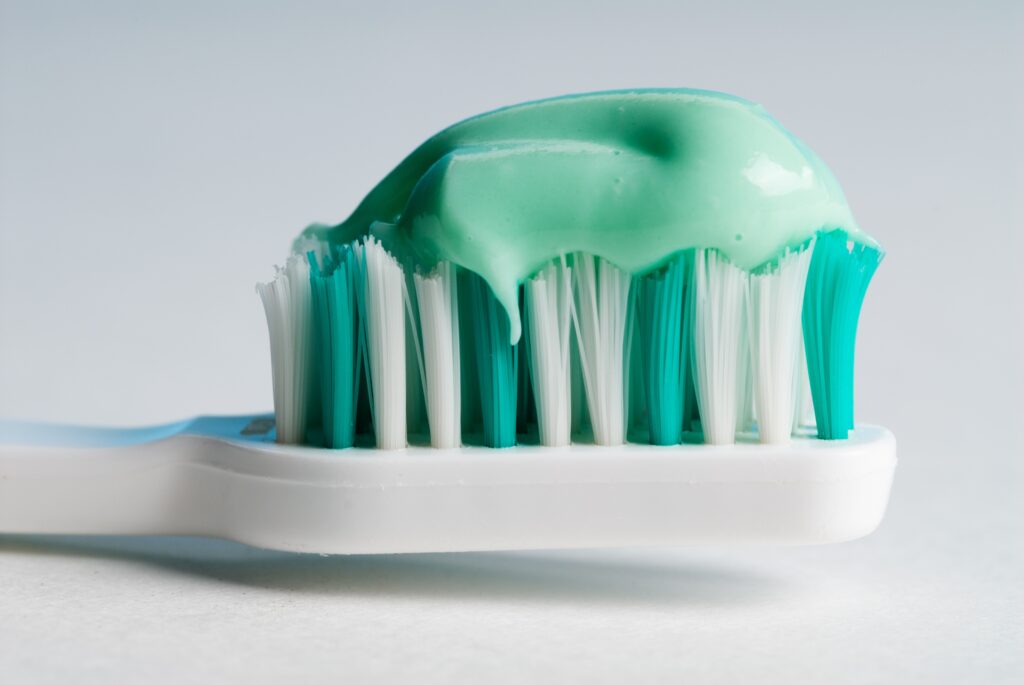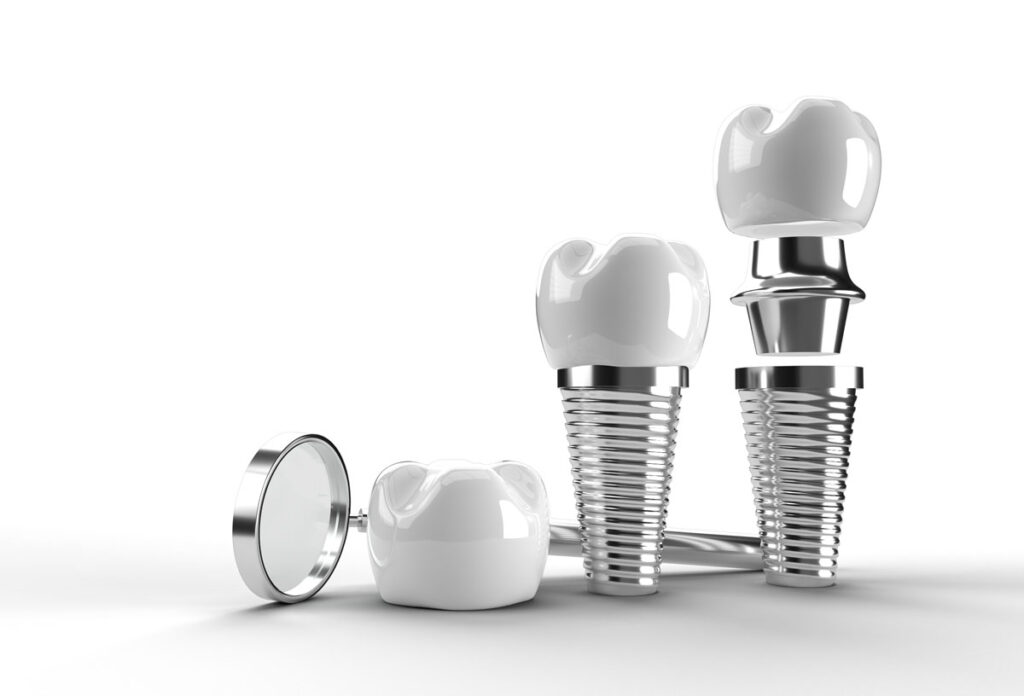When it comes to finding a dentist, or even evaluating the one you have, how do you differentiate between the good ones and the bad? We’ve offered some helpful tips below to help in your evaluation. Keep in mind though, no dentist office will be perfect, but you should at least see them working on some, if not all, of the areas mentioned. Pick out what’s most important to you in a dentist and filter your experience through that perspective. And pay close attention to the special categories marked below as these are the areas we believe should be top on your list.
First Impression
The first impression of your dentist and his/her office actually consists of three parts.
- The scheduling. This is where it all begins—the phone call when you make your appointment. Is the receptionist kind and open to answering your questions or does he/she respond more harshly? A dentist’s staff says a lot about the dentist and his/her practice.
- The office. What feeling do you get when you walk into the dentist’s office? Does it feel welcoming? Does the staff at the dental office seem happy and helpful? If you’re just given a clipboard and told to sit down without much introduction or sense that they even care you’re there, you may be in the wrong dental office. Additionally, have a look around the office. If the office is dusty and unclean, you are being well-warned that their dental office isn’t sterile, which means the instruments the dentist uses to put into your mouth won’t be either. If that’s the case, get out of there and find somewhere else to go!
- The wait. The last step of your first impression includes the wait. While I wouldn’t base your decision solely on the wait, because some dentists may encounter difficult problems they couldn’t plan for that day, it’s still something to consider.
*Pain Level
A mark of a good dentist is being able to give treatment in a way that minimizes a patient’s pain. Poor dentists will not worry about minimizing a patient’s pain and will be much rougher in administering routine care like cleanings or giving shots.
*Equipment Cleanliness
Find out how they clean their equipment. How do they sterilize it? A high quality dental office will not be offended by you asking the question and they might even show you what they use to clean their equipment.
*Good Hygiene
If your dentist keeps his/her gloves on after he/she has cleaned your mouth and you see him/her rummaging through drawers, writing notes or doing anything else, that’s not a good sign. And if you see your dentist doing any of these things before cleaning your mouth, that’s an even worse sign.
*Monetary Obsession
Good dentists care about their patients and improving their oral health. They aren’t interested in scamming their patients or getting as much money as they can out of them. You may believe it’s impossible to know for sure, but there are some sure ways to figure out where their real intentions lie.
- Extreme and Unnecessary Procedures. While some extreme procedures are necessary depending on the state of your teeth, if your dentist jumps immediately to that option without covering any other alternatives that might be less expensive, find another dentist or seek a second opinion. Now, if it’s really necessary, they may lay out your options and then tell you which one they recommend, but they shouldn’t force you to choose the most expensive option. Additionally, if this dentist recommends expensive procedures every time you come in, it’s a clear sign they care more about money than about you.
- Upselling. Be cautious of dentists who try to sell you extra products like bottles of vitamins and herbs that can help your oral health. It will be hard to tell if these products will actually be a help to you or if it’s just their way of making a quick buck.
- Payment. If a dentist requests the full payment for your dental work before the dentist even begins the work, red flag.
- Checking the Bill. If you had a simple dental appointment with no major problems, your bill should reflect that. If a dental office spends a lot of their time itemizing your bill and suggests costly procedures every time you go in, or if they are not willing to work with you on a payment plan, it’s time to find another dentist.
*Poor Work
If your fillings fall out, veneers come off and crowns come loose not long after the work has been completed, it could be a sign that you are seeing a bad dentist. However, if you ate something your dentist told you to stay away from and your filling or crown or veneer came loose, don’t blame your dentist.
Staff Queries
Get to know your dental hygienist. Ask him/her if their family gets their dental work done at that office. If they say no, that should be a red flag for you. If the dental hygienist isn’t even comfortable bringing their family there, then you shouldn’t be comfortable going there either.
Post-Checkup Response
How do you feel after your checkup? Your dentist is supposed to improve your dental health not create more problems. A good dentist can provide his/her patients with routine services without causing you longer discomfort. If you’re still experiencing bleeding weeks or months after you have had a root canal, crowns, bridges, or if you dentures keep falling out, then you need to find a new dentist, no question.
Conclusion
Know the Difference Between Good and Bad Dentistry
Here’s how (ask yourself these questions):
- What is your first impression of the dental office based on scheduling, office atmosphere and wait time?
- What is your pain level at the office? Does the dentist try to minimize your pain during treatment?
- Is their dental equipment clean?
- Does the dentist practice good hygiene before cleaning your mouth?
- Have you noticed a monetary obsession at that particular office through suggesting extreme and unnecessary procedures, upselling or requesting full payment before dental work is given.
- Do you have to get repeat work done? If so, that may be a reflection of poor dental work. Not always though.
- Do they follow up with their patients after a checkup?
Filter your experience through this lens and you’ll be able to determine the quality of your dentist. Need more tips on evaluating your dentist, see How to Interview a Dentist.
What has been your best dental experience? Describe it for us in the comment section below.







I have gotten where I don’t trust any dentist. I might have to go to one, but I don’t trust any of them.
If the government wants to control everything then they need to take over this dental industry.
These people could rob banks and get away with it.
I’m so sorry you are feeling that way. There are many trustworthy dentists out there, but sometimes after having a bad experience–or maybe several–it can be hard to trust any of them. I hope that you will continue to go to your regular dental checkups and that you find a dentist that is honest, trustworthy and personable!
I completely agree, especially in Florida! I was a dental assistant in RI…and worked for some good and some bad..but there were plenty of good dentists there..however that was over 20 years ago..
living in Sarasota Fl. Previously Delray, I have had the most unbelievable experiences!! The dentist on Atlantic Ave in Delray should not have a license! I put him on yelp.. here in Sarasota, another dentist, I decided to try it because the office manager convinced me it was good.. it wasnt!! Very arrogant money hungry dentist. Did not know how to do a crown properly or bridge…It was never done right!!! already coming off . I had bridge on opposite side for 30 years that looks and feels better than this one.. I tried to tell him, wouldn’t listen..They now changed there name from Corner Dental. To Sage! Beware.. after I wrote him up.. it’s True. No one’s policing them!!! Florida ranks 4th from the bottom. I will have to go to RI to have my teeth fixed.
What do you do about a dentist you went over all the estimates , total costs , and paid up front to have extensive work completed… Then after every tooth in your mouth was prepped for crowns. ( which goes into tens of thousands ).. hits you with thousands of more dollars in costs , that the estimates show was included in the original cost.. ?.. Then when you sit down and itemize the work done , realize they already overcharged you ?.. Who do you contact , when now you have had temporary teeth in for almost 5 months ; and just get harassed for the money ,before they will give you your permanent crowns..??
That’s a really unfortunate situation. I’m so sorry you’re going through that right now.
First, you should reach out to your dental insurance or dental plan provider if the dentist is not honoring the fees they promised or contracted to give, which it doesn’t sound like they are.
Second, if you don’t have a dental insurance or plan provider, I would recommend filing a complaint with your state board of dental examiners (For example, Texas has information about filing complaints here: https://www.tsbde.texas.gov/complaints.html). They may be able to help you or steer you in the right direction for next steps.
Is their a dentsl assocation to call about my dentist?
I feel kike I’m being scammed. Thanks
Brian Toubman
Hi Brian, that’s a really great question. I’m sorry for my delayed response! Your state should have a Board of Dental Examiners. For example, Texas’s board of dental examiners has a place on this page with information about filing a complaint: https://www.tsbde.texas.gov/complaints.html
I would also recommend letting your insurance or dental plan provider know about your experience if it was at a dentist in their network. They will want to know that so they can remove that dentist from their network, if necessary.
A month ago I broke a tooth on a pop corn kernel. We had some changes of insurance and so I went to a new dentist to me that my husband had seen. While there he said that it looked like I needed a new crown and should have my filling removed in that tooth and the next one to it as the silver fillings was part of what caused the breakage. I assumed he knew what he was taking about and agreed and he drilled out the fillings and said they could create new crowns in house. He had a piece of equipment that that he placed in my mouth that held my tongue to the side and kept my mouth open wide. It was very uncomfortable to have in my mouth and he said it was because I had a small mouth. I had to ask for more pain killer when hours later they put the crown in my mouth and things had worn off and he didn’t check first. I have had to go back two times for bite adjustment and I have had a lot of tooth and jaw pain since. I still am still having problems but starting to feel he may have just have done a poor job from the start and I don’t trust him to fix it. He has ground down a lot of both teeth and they feel very rough. Am I crazy?
I’m so sorry to hear that, Tamara. It definitely wouldn’t hurt to get a second opinion and see if another dentist might be able to correct the problem. I would recommend looking for another dentist near you that you can go to who accepts the dental plan you have and see if they can help!
Most of these dental plans are about as phony as some of the dentist. If your paying less then 200.00 per year then when you get your discount the dentist gets NOTHING on this plan. All you are doing is paying for his advertisement so if he can give a discount with this so called plan then he could do it for the price you end up paying. I would think this could get around a lot better than charging some of these out of sight prices.
If you don’t believe this then call some of them (plans)and find out. Probably have to ask about 4-5 times before they will tell you.
I had dentist that every time I went in she would hit my teeth really hard with her equipment and then in a day or so the tooth would break and she is known as the crown queen and thats exactly what she did I spent out of pocket 5 crowns and 10,000 dollars in a year and the services had to be payed right after the work. I have had fillings she did fall out in 3 months of them being in…And she said don’t worry we will put a crown over it…Chipped a tooth crown..etc…I am seeing another dentist who doesn’t leave holes around the filling either…
Oh my gosh! That’s awful!! I’m so sorry. 🙁 Have you submitted a complaint? Many states have state dental boards where you can issue complaints or concerns about providers you’ve seen. I’d also recommend letting your insurance or dental plan provider know so they can investigate.
I’m glad you found another dentist!
File complaint I did on one and they got right on it. there are good dentist, but it is a crooked industry.
I went to a dentist for a check up. He was nice and explained everything about the procedures I needed and answered all my questions. His office was clean. When he was checking my teeth, he had his hands clean but wasn’t wearing any gloves. I asked if I had any gum desease. He said yes but said he wasn’t very concerned about that and that i needed orthodontics since the cleaning was difficult with my crooked teeth. He said when my teeth were straight, it would eventually disappear. What should i do? Should i trust him? Thanks in advance.
Hi Helena. Sounds like you had a good experience at your dental visit. Because orthodontics are so expensive and gum disease can be a serious thing if not treated (it can eventually affect your overall health as well as your oral health), it wouldn’t hurt to get a second opinion from another dentist nearby!
Went to a dentist for root canal procedure with a cavity initially between 1st and 2nd premolar of upper left jaw. After root canal of 1st premolar , he did filling of the adjoining surface of 2nd premolar.Later he said its better to leave a gap in between for cleaning with brush. I couldn’t see it that time but after going home I saw a gap of around 2-3mm. was it really required?or is it some way to get the job done quickly?
I’ve actually heard that, as well. When I had to get a filling in between my teeth, my dentist left a slight gap in between so I would still be able to clean and brush in between the teeth. Not doing so could leave the tooth at risk of further decay.
2-3mm seems excessive (approximately the thickness of a US nickel)
I’m 15 years old and have never been to a dentist before. It’s because my parents have had bad luck with dentists in the past, and don’t want to put me through that, but I have a baby tooth that I have never lost and it has pushed my permanent tooth to the back of my mouth. Whenever I smile, you can see that it’s crooked and there’s also a blood stain on it that won’t come off. It really bothers me and I want to do something about it but I don’t know what to do.
We’d recommend finding a dentist to visit to ask for his/her suggestion on this. If you don’t have a dental plan, please check out one of our plans by visiting our website and see how much it can save you.
I went to a dentist because of a premolaire i fixed years ago bu had the filling break lately. Told him to fix it since the tooth does not hurt me to just clean and fill it back. He got mad saying I should take it off. I refused saying if I do i will lose the alignment of my set of tooth. He proceeded with root canal sessions. Every day I ask how much and he says later in 4 or 5 days when I finish with the root canal procedures I will tell you. The first day my tooth was fine. The next day he didnt fill it all n told me to go and asked for treatment and he said you need none. Thay night my tooth started hurting me. The 3rd day went there to tell him that i couldnt sleep it was hurting me. He said i should have listened and took it off. Told him to take it off then and he had the hardest time pulling my tooth out as it was as a rock, he said he never seen a tooth that hard to get out. He then told me after extracting my tooth that he can’t prepare me an implant and can’t assure that my teeth alignement wont be messed up and that i should look for an orthodontist and he asked me to pay him and not come back as his job is done. And im now for two days aching and regretting my choices. Never listen to a dentist that doesn’t explain much and gets mad when you ask him too much questions. Any ideas how to ease the pain after a tooth extraction. I’m suffering so much and that douche didn’t even give me any treatment.
We’re so sorry you had to go through this, Lana. That sounds terrible. I’m sure you are not at a place where you feel like doing this, after your recent experience, but your best course of action is to visit a different dentist who is willing to help you and make sure that your mouth is not infected from this latest tooth extraction. If you would like our help finding a dentist near you who can help you that accepts one of our plans, please give us a call at 800-372-7615. Someone would be happy to assist you in your search.
I have been with this dentist over 25 years. He just hired a new dentist about one year ago. I have not been able to see the original dentists since he hired the new dentist.
From the first time I saw the new dentist the quality of my treatment has declined.
I have asked to see my original dentist and each time when I get there it’s the new dentist.
I would hate to have to change dentist but almost each time the new dentist does work on my teeth I am in pain either the same day or a few days later.
I thought I had the best dentist in the state.
I hate to do this but if I can’t see my original dentist, I will have to find a new dentist .
Work on bottom teeth in December; my snap in dental implant looks crooked, my top (been wearing plate 20 yrs) began to receive pinching,irratation been back to have adjustment apx 6 times, in which time he is now shaving my top denture (which I must replace due to discoloration; never explained that part, went whiter of course) yesterday, the dentist told me some people have one jar higher that the other, it sounds crazy, now he wants money to replace my top due to he is not provided a temp top until he finishes my top snap implant. I have paid him over $8000 for a $15,600 top/bottom snap ins What do I do? all he seems interested in is the money how do i get this resolved (I paid for perfect smile not poor quality smile) in Maryland Mind you, my top has not been started.
I am so sorry you’ve been through all that! That is terrible. I know many people are able to negotiate prices with their dentists, especially in cases where the issues are due to faulty work from the get-go. For example, many dentists will adjust a filling free of charge if the original filling is messing up the person’s bite. It seems like your dentist should do free adjustments if the procedure never worked out for you.
If your dentist is not willing to work with you on that, you may want to ask friends and family for recommendations of another office that’s known for high-quality work on implants and dentures. Reviews on search engines like Google can also be a good resource. You’ll want to make sure any other dentist you choose understands what you’ve been through and has records of the work that’s already been performed.